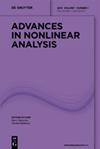Higher integrability for anisotropic parabolic systems of p-Laplace type
IF 3.7
1区 数学
Q1 MATHEMATICS
引用次数: 1
Abstract
Abstract In this article, we consider anisotropic parabolic systems of p p -Laplace type. The model case is the parabolic p i {p}_{i} -Laplace system u t − ∑ i = 1 n ∂ ∂ x i ( ∣ D i u ∣ p i − 2 D i u ) = 0 {u}_{t}-\mathop{\sum }\limits_{i=1}^{n}\frac{\partial }{\partial {x}_{i}}({| {D}_{i}u| }^{{p}_{i}-2}{D}_{i}u)=0 with exponents p i ≥ 2 {p}_{i}\ge 2 . Under the assumption that the exponents are not too far apart, i.e., the difference p max − p min {p}_{\max }-{p}_{\min } is sufficiently small, we establish a higher integrability result for weak solutions. This extends a result, which was only known for the elliptic setting, to the parabolic setting.p-Laplace型各向异性抛物型系统的高可积性
摘要本文考虑p p -拉普拉斯型各向异性抛物系统。模型情况是抛物型p i {p_i}-拉普拉斯系统u t−∑i=1 n∂∂x i(∣D iu∣p i−2D iu)=0 {u_t}- {}{}\mathop{\sum }\limits _i=1{^}n{}\frac{\partial }{\partial {x}_{i}} ({|{ D_iu}| ^{p_i}- }2d_iu{{)}={0,指数p i≥2 p_i }}{}{}{}{}\ge 2。在指数差不太远的假设下,即p max−p min p_ {}{\max -p_ }{}{\min的差足够}小,我们建立了弱解的高可积性结果。这将只在椭圆设置下才知道的结果扩展到抛物线设置下。
本文章由计算机程序翻译,如有差异,请以英文原文为准。
求助全文
约1分钟内获得全文
求助全文
来源期刊

Advances in Nonlinear Analysis
MATHEMATICS, APPLIED-MATHEMATICS
CiteScore
6.00
自引率
9.50%
发文量
60
审稿时长
30 weeks
期刊介绍:
Advances in Nonlinear Analysis (ANONA) aims to publish selected research contributions devoted to nonlinear problems coming from different areas, with particular reference to those introducing new techniques capable of solving a wide range of problems. The Journal focuses on papers that address significant problems in pure and applied nonlinear analysis. ANONA seeks to present the most significant advances in this field to a wide readership, including researchers and graduate students in mathematics, physics, and engineering.
 求助内容:
求助内容: 应助结果提醒方式:
应助结果提醒方式:


